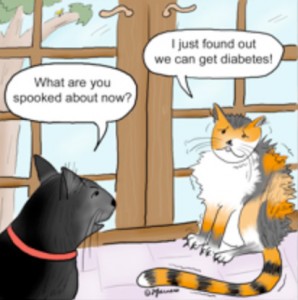Type 1 diabetes, the form of the disease that strikes the young, is actually quite rare in animal companions.
Your cat or dog is much more likely to develop Type II (adult-onset) diabetes around middle age or in their senior years.
Some common signs of diabetes in dogs and cats include:
- Excessive thirst
- Excessive urination—your pet produces more urine per
day and may have “accidents” in the house (dogs) or
outside the litterbox (cats) - Excessive hunger while losing weight
- Lethargy (less active/sleeps more)
- Cloudy eyes (dogs)
- Doesn’t groom (cats)
- Thinning, dry, and dull hair
- If your dog or cat exhibit any of these symptoms visit your veterinary health care provider.
 Dogs and cats with diabetes can develop other health problems. For dogs, the most common complication of diabetes is cataract formation. Persistently high blood glucose levels make the lens of the eye become opaque, causing blindness.
Dogs and cats with diabetes can develop other health problems. For dogs, the most common complication of diabetes is cataract formation. Persistently high blood glucose levels make the lens of the eye become opaque, causing blindness.
For cats, weakness of the hind legs is a common complication. Persistently high blood glucose levels may damage nerves, causing weakness and muscle wasting.
What can you do to prevent your animal from developing diabetes?
Obesity is far and away the biggest reason that animals become diabetic. You can help your dog or cat stay trim by feeding him a portion controlled, moisture rich species-appropriate diet, consisting primarily of a variety of unadulterated protein sources, healthy fats, and veggies.
Many commercially produced pet foods contain carbohydrates. Your pet has no biological requirement for grains or most other carbs. Carbs, which can be as much as 80 percent the ingredient content of processed pet food, turns into sugar in your pet’s body. Excess sugar leads to diabetes.
Making sure your pet gets plenty of exercise, will help your animal companion to maintain an appropriate weight and keep your dog/cat emotionally balanced and calm. Not only will you be helping your animals, but yourself when you take your companions of a walk.
All animals benefit from supplements. Give your dog or cat an Omega fish oil and a probiotic. Both of these supplements help to keep your animal healthy. Using essential oils and flower essences to maintain good health will help to decrease your animal’s possibility of developing diabetes. If your dog or cat has diabetes there are a number of essential oils and flower essences which can support them. For stress I suggest Lavender, Chamomile and Frankincense. If your animal has diabetes consider using Coriander and Lavender. There are three Flower Essences made by Green Hope Farms which I like; Immune Support, Digestive Woes and Senior Citizen.
